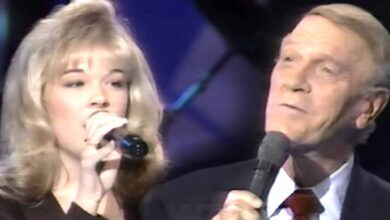The performance inspires pride and gratitude in U.S. veterans, highlighting the need to honor their sacrifices.
“Ballad of the Green Berets,” performed by Sgt. Barry Sadler, emerged during a turbulent period in American history, capturing the complex emotions tied to military service. Released in 1966, the song served both as a rallying cry for supporters of the Vietnam War and as a heartfelt tribute to the sacrifices made by servicemen. As the Vietnam War became increasingly contentious throughout the decade, it created significant cultural rifts within the United States. Unlike the protests that characterized this era, Sadler’s song celebrated the courage and commitment of soldiers on the front lines.
Written while Sadler was recovering from injuries sustained in Vietnam, the ballad carried an authenticity that resonated with audiences of the time. Its direct and powerful lyrics centered on themes of bravery and camaraderie, fostering a sense of pride among those who supported the military effort abroad. The song’s memorable chorus quickly became iconic, reinforcing the image of the Green Berets as elite fighters willing to sacrifice everything for their country.
The narrative highlights the heroic deeds of Special Forces, portraying them as valiant participants in a challenging conflict often marked by feelings of neglect from both the government and the public. Sadler’s passionate performance brought forth the honor and valor of these soldiers, creating a stark contrast to the growing disenchantment many Americans felt regarding the Vietnam War. While numerous citizens voiced their dissent, “Ballad of the Green Berets” articulated the beliefs of those who still valued the mission of the troops.
Sadler’s own military experience added significant emotional weight to the song. After enlisting in the Air Force, he transitioned to the Army and became a Green Beret. His firsthand experiences shaped his songwriting, offering perspectives that many civilians might not have understood. He vividly depicted the Green Berets as elite warriors, embodying the ideals of discipline, courage, and sacrifice—values that resonated deeply with listeners and fostered a sense of national pride.
Upon its release, “Ballad of the Green Berets” experienced remarkable commercial success, topping the Billboard Hot 100 for five weeks and becoming one of the best-selling singles of 1966. Its appeal transcended borders, connecting with military personnel and civilians worldwide who related to its themes of honor and service. The song’s translations into various languages highlighted its universal resonance and appreciation for those who serve in combat.
Following this musical success, Sadler ventured into different areas of the entertainment industry. Despite his early triumph, he struggled to replicate the impact of the ballad in subsequent projects. He pursued acting and writing, particularly working on the “Casca” series, which drew on his military experiences but never achieved the same level of connection as his earlier work. This struggle created a contrast in his life as a talented musician and soldier grappling with the complexities of post-war fame and creativity.
As the years went by, Barry Sadler faced increasing personal challenges. His later life was marked by difficulties, including financial woes, legal troubles, and a tragic shooting in Guatemala that left him severely injured. These events starkly contrasted with the patriotic image he had cultivated and raised questions regarding the effects of trauma and the struggles veterans encounter when transitioning to civilian life.
Sadler’s death in 1989 marked the end of a complicated legacy. He is remembered for his musical contributions and the portrayal of Special Forces, along with the personal adversities he faced. “Ballad of the Green Berets” continues to serve as a tribute to those who serve, evoking strong feelings of pride and patriotism during military events and ceremonies across the nation.
The enduring legacy of the song underscores a vital aspect of American culture—the respect and acknowledgment for military sacrifices amid divisive conflicts. While discussions about war may evolve, “Ballad of the Green Berets” remains a timeless reminder of soldiers’ dedication to their duties. Its ongoing presence during military events ensures that the sentiments conveyed by Sadler resonate with both veterans and civilians alike.
In examining the impact of “Ballad of the Green Berets,” one can see how music can echo and shape public sentiment. Barry Sadler’s life and artistry illustrate the intricate relationship between art, patriotism, and the real-life experiences of those who serve in the military. His song endures as a defining anthem that transcends generations, honoring the sacrifices of the soldiers it celebrates. Thus, Sadler’s work remains an essential component of the American narrative, a testament to those who answered the call of duty, irrespective of the controversies surrounding their service.





